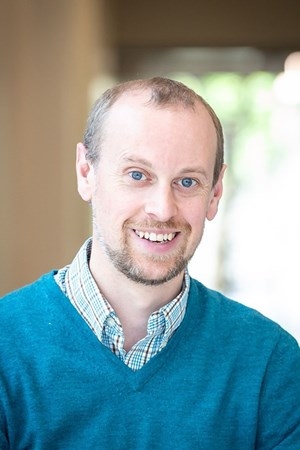The U of A's Martin Edwards will give a virtual seminar titled "Innovative tools for nanoscale electrochemical investigation" on Zoom from 4-5 p.m. Friday, Oct. 16. The talk is free and open to the public.
Edwards joined the Department of Chemistry and Biochemistry at the University of Arkansas as an assistant professor in August 2020. Prior to this he held the position of research professor in the group of Henry White (Utah). Martin received his doctorate in interdisciplinary science (MOAC) at the University of Warwick, United Kingdom, supervised by Patrick Unwin. He followed this with postdoctoral research in the groups of Gabriel Gomila (IBEC, Barcelona) and Mark Wightman (UNC).
His diverse research interests in electrochemistry are driven by desire to cultivate a fundamental understanding of interfacial processes occurring at the micro- and nanoscale. Using an approach that combines physical and analytical measurements with modeling (mathematical/statistical/numerical), he has tackled problems in areas ranging from neuroscience and nanoparticles through nanobubbles. A constant thread in his research has been the development of novel instrumentation and experiments, which frequently involve the development or modification of scanned probe microscopes. He was the 2020 recipient of the Royce Murray Young Investigator award from the Society of Electroanalytical Chemistry (SEAC).
In typical electrochemical measurements the current or voltage is a single quantity that describes processes occurring over an entire electrode surface. Yet electrodes are almost always heterogeneous, e.g., electrocatalytic nanoparticles on carbon supports used as electrodes in fuel cells and for heterogeneous catalysis; bimetallic electrodes used as electrocatalysts with enhanced performance; battery electrodes are a mix of 'active material', binder and conductive components; even single crystal electrodes contain steps and defects with different electrocatalytic activities. Thus, by reporting a single value for an entire sample, different regions are averaged over and underlying processes are obscured. This makes interpretation more challenging.
Edwards will examine how reducing electrochemical measurements to micro- or nanoscopic regions of a surface allows the local electrochemical behavior of a heterogeneous sample to be determined. When repeated measurements are performed over a sample, the resulting map of the localized electrochemical behavior describes where electrochemical processes are occurring, which leads to greater insight.
In this talk, Edwards will describe electrochemical tools he uses in his research to spatially map the electrochemical activity of surfaces. He will provide examples where this information is used to address scientific questions in the areas of energy and electrocatalysis and will discuss future of avenues of nanoelectrochemical research in the Edwards group.
To attend the seminar, please visit the Zoom link.
Meeting ID: 873 4638 0922
Passcode: 8x&W7k)B
Topics
Contacts
Megan Parette, communications officer
Department of Chemistry and Biochemistry
479-575-4601, mbparett@uark.edu
